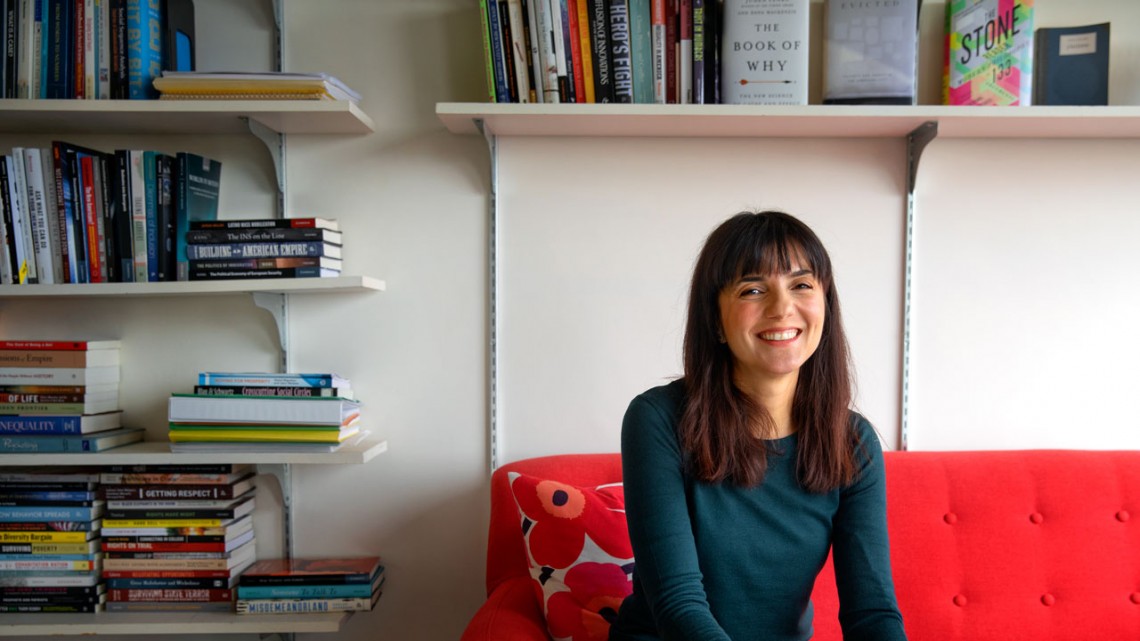
Filiz Garip, professor of sociology, is the new director of the universitywide Center for the Study of Economy & Sociology.
New director leads Center for the Study of Economy & Society
By Susan Kelley
An engineer-turned-sociologist whose career has been defined by interdisciplinary thinking is now leading a Cornell center that brings together economists and sociologists, from across campus and around the world.
Trained as an engineer in Turkey, Filiz Garip, professor of sociology, has been named director of the Center for the Study of Economy & Society, an incubator for new ideas and research in economic sociology. Garip brings to the center her wide-ranging interests and international perspective, with collaborations ranging from political science to computer science and statistics, and a research toolbox including qualitative research, field work and historical analysis, as well as quantitative methods.
“We don’t have many places where we can have these interdisciplinary conversations,” she said. “This center is really a magical place where we can make that happen.”
For example, one of its working groups, comprising researchers at Cornell, Sweden’s Lund University and China’s Renmin University, is looking at the institutions and networks that drive the growth of high-tech firms in New York City, southern Sweden and China’s Yangtze delta region.
Formerly a professor of sociology at Harvard, Garip joined Cornell’s faculty in 2016. Born in Turkey, she earned a bachelor’s degree in industrial engineering at Bogazici University in Istanbul, and a master’s in operations research and financial engineering from Princeton University. At Princeton, she began to doubt her interest in the field. “I was looking for something different,” she said.
She took a few sociology classes – and found the beginnings of a new academic career. “I remember learning about family and gender, relations within the family, and it was kind of mind-blowing,” said Garip. “It was questioning everything that you take for granted: what it means to be a woman, what it means to be in a particular setting and how that shapes your behavior and how you see the world. Suddenly you start seeing your life in a different light.”
She earned a doctorate in sociology from Princeton, and her research now focuses on the mechanisms that affect mobility and lead to greater or lesser degrees of social and economic inequality. Her 2016 book, “On the Move: Changing Mechanisms of Mexico-U.S. Migration,” characterizes the diversity of the Mexican migrant population in the United States.
“Since its founding in 2001, the center has gained international recognition as a leader in innovative scholarship dealing with intersections between social structure and economic life,” said Victor Nee, the Frank and Rosa Rhodes Professor of Economic Sociology, who recently stepped down as the center’s founding director. “Filiz’s work addresses these issues in the context of contemporary global migration. She is poised to lead the center and maintain its high profile.”
Garip’s vision for the center includes more overlap with researchers in Computing and Information Science and a greater focus on big data research. “What if we have online purchase records, or Twitter data?” she said. “How do we analyze it to understand how social relations and culture affects economic behavior?”
She’d also like to expose Cornell students to researchers working in cultural analysis within economic sociology, and how to use sociological tools to understand the economy; for example, sociologists are increasingly interested in how people bring their moral values into their economic behavior.
Insights from economic sociology are helpful in whatever phenomenon is being studied, she said.
For example, in the area of migration, one could come up with an economic explanation for why people leave their home country: They want to do better economically. But social processes play a significant role, too. “You’re much more likely to migrate if your family members have migrated, if your community has a lot of migrants. It becomes a cultural thing,” she said. “Economic sociology is such a generative way of thinking about different problems.”
It’s also one of the fastest growing subareas in sociology, she said, and an area in which Cornell has been influential. “The big contribution of Cornell’s school of economic sociology has been demonstrating the importance of institutions in economic behavior, and they have started the new institutionalist school within economic sociology,” she said.
The center has trained graduate students who are now some of the more prominent names in the field, including Damon Centola, M.A. ’04, Ph.D. ’06, of the University of Pennsylvania and Daniel DellaPosta, Ph.D. ’17, of Pennsylvania State University, Garip said.
She plans to continue the center’s current activities, including yearly interdisciplinary workshops, publishing the results of those workshops in book form, supporting research, and welcoming faculty fellows from other institutions.
She will also continue Nee’s tradition of giving faculty fellows from other institutions keys to the center’s offices. “When they come to visit Cornell, they have a place here.”
Media Contact
Get Cornell news delivered right to your inbox.
Subscribe
